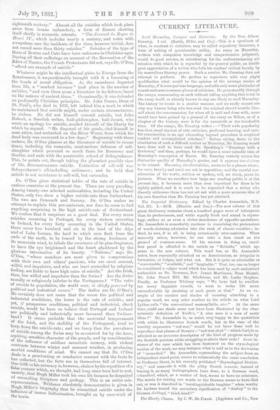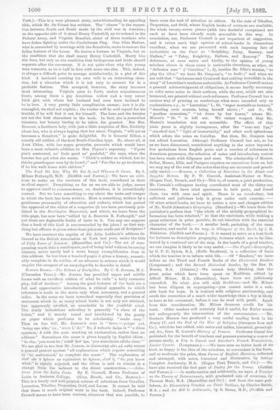The Bloody Chasm,. By J. W. De Forest. (Appleton and
Co., New
York.)—This is a very pleasant story, notwithstanding its appalling title, which Mr. Do Forest has written. The" chasm" is the separa- tion between North and South made by the civil war in America ; on the opposite side of it stand Henry Underhill, an ox-colonel in the Federal Army, and Virginia Beaufort, sister of three brothers who have fallen fighting under the Confederate Flag. One Silas Mather, who is connected by marriage with the Beauforts, seeks to restore the fallen fortune of the house. He leaves a fortune to Virginia, but on the condition that she shall marry Henry Underhill. Marry him she does, but only on the condition that bridegroom and bride should separate after the ceremony. It is not quite clear why this young man consents, as he is half in love with some one else. This, indeed, is always a difficult point to manage satisfactorily, in a plot of this kind. A husband courting his own wife is an interesting situa- tion, but a situation which it is not easy to account for in a
probable fashion. This accepted, however, the story becomes most interesting. Virginia goes to Paris, makes acquaintances there, among them a gay American widow and a very sweet Irish girl, with whom her husband had once been inclined to be in love. A very pretty little complication ensues ; how it is dis- entangled, we Shall not explain ; the reader will be well repaid for his trouble, if he will find it out for himself. The hero and the heroine are not the best characters in the book. In fact, she is somewhat tiresome, her beauty having to be taken for granted. But Mrs. Dumont, a Southern lady, with jest a little suspicion of Mrs. Nickleby about her, who is always hoping that her niece, Virginia, "will act as becomes a Beaufort," is quite delightful. So is General Hilton, a courtly old soldier, of the best South-Carolina type. So, above all, is Aunt Chloe, with her negro proverbs, proverbs which would have been a most valuable addition to Mrs. Poymer's repertory. " S'pose you's contented, an' feels good an' grateful," she says, when the heroine has got what she wants. " Chick'n nebber so wicked, but he thinks grasshopper sent by de Lawd ;" and "Fox like to go to church, if he kin walk home with chicken."



































 Previous page
Previous page